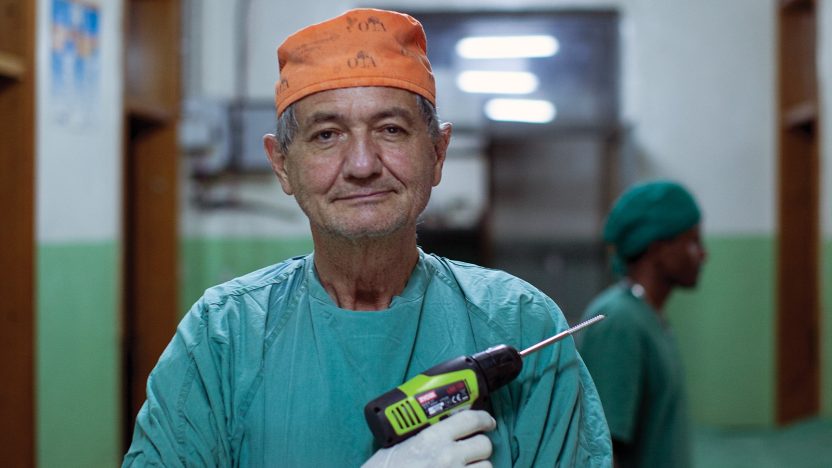Moving towards virtual healthcare
Apps and telehealth can give people access to a doctor on their smartphone whenever they need them, especially during Covid-19.
by MAIZE

<a href="https://www.maize.io/en/contributors/jose-bastos" target="_blank" rel="noopener noreferrer">José Bastos is a co-founder and CEO of knok healthcare, a SaaS healthcare / insure-tech startup offering an integrated solution for remote medical consultations through a combination of AI triage, scheduling, video consultations, health records, and integration with hospitals or clinics. As Covid-19 has made virtual interactions the ‘new normal,’ Bastos shares what that means for the future of healthcare.
How is knok aiming to change people’s access to healthcare?
Our app gives people access to a doctor on their smartphones whenever they need them. They can book a video consultation through our web app with their existing medical team at their usual hospital or clinic. We are working on optimizing a doctor’s time by giving them access to data about you before a consultation. All of the admin work that comes before and after the consultation is just wasted time, and we are working on reducing it, while improving the quality of data, so that the quality of the insights that the doctor gets from the consultations are higher.
Why does it matter?
Today, insurers and medical practices are compelled to offer remote solutions. They either have to adopt massive, multi-million dollar projects that fundamentally change the existing procedures and workflow, or use Skype, Whatsapp, or Microsoft Teams, without HIPAA and GDPR compliance, patient friendliness, or integration and easy access to health records and data for patients and physicians. Since our main focus is doctor-patient communication, we continuously improve the product, bearing in mind the provision of relevant information and tools for the doctor to deliver quality care.
Yanwu Xu, principal health architect for Baidu Health, one of China’s largest internet corporations, and one of three companies contracted by the Chinese Government to implement virtual care technologies, said that in China, patients were advised to seek a physician’s help online rather than in person after the Covid-19 pandemic first emerged in Wuhan in December. Following China’s example, the Centers for Medicare and Medicaid Services (CMS) in the US implemented new measures which will allow for more than 80 additional services to be furnished via telehealth. Has knok’s virtual user base increased since the Covid-19 pandemic began?
The volume of consultations between January — which is always our strongest month — and April, multiplied by almost four times. It’s clear for everybody that peak Covid is probably in the past, so now things are calmer. But still, we keep generating leads and we have people interested in adopting our technology who are now reaching out to us and we are deep diving in the UK and Italy as our next markets. So I think what this means in practical terms is people understood that something changed. And having understood that something changed, they now want to adapt their offer, their medical channels offer from going to hospitals or clinics, plus a virtual channel. And I honestly think that the hurdle to digital health is much more related to the management of health companies than to the patient’s adoption. And the thing that surprised some of our clients the most is that between 60 to 70 percent of patients who used video consultations said that they didn’t feel that the experience was short on anything when compared to a physical consultation. There are some medical specialties where the doctor is supposed to touch you, like if you go to a doctor who needs to hear your lungs, they will need to put a stethoscope on you. So of course, the experience is not the same or it may not even work. However, let’s say you go to a cardiologist or you go to an endocrinologist if you’re a chronic patient. They will look at your ECG, they will look at some blood tests, and having looked at both, they will diagnose you and prescribe treatment as needed. In practical terms, you do not need to be physically at the doctor’s office, and the patient experience in terms of what you take away from the consultation is the same. You avoid going to the hospital, parking, waiting for an hour, versus having an online consultation where you push a button and start.
What will the healthcare of the future look like and how is knok helping people to prepare for that?
People are already used to doing video chats with their friends and family. So if patients are used to doing this with their friends and if doctors are used to doing this with their patients, the closest ones, what we are saying here is we have just now brought to front and center stage what people were kind of doing behind the curtains with WhatsApp chats with their doctors, and it’s now organized and structured with a safe and secure tool, with GDPR and HIPAA compliance, that has scheduling and an electronic health record module, because it’s born and built for healthcare.
After you’ve had a cardiologist consultation at home, will you ever want to go back to the doctor’s office if you can access the same exact doctor doing the exact same consultation without even going there? That to me is the million dollar question for healthcare systems.
I think healthcare in the future will be much more decentralized. There’s a couple of things that are critical for this to work. The first thing you need is to generalize standards, and the second, is to build something called a health passport, which is giving you access to all of your health data wherever you go. And the moment you do that, you as a patient become the owner of your own healthcare information. And the moment you become the owner of your own healthcare information you will have your own centralized place where you can accumulate data, which will allow systems and AI to act with a much wider database. This is probably going to take five years, I hope it takes less. But honestly, I think it’s hard because the healthcare system is very slow to change. But the way this will work is by empowering you as the final user to access your own tools and your autonomy to reach out to the best practitioners anywhere and take hold of your own conditions. Using digital tools you can aggregate the information and ensure that you are always on top of whatever you have. This will have a massive impact on chronic patients more than anything else.
If you have a chronic condition today, let’s say diabetes, you prick your finger on a little device, if that device can communicate with an app that you have on your cell phone and that app can speak a standard language with some other apps in the hospital or with your doctor, then your doctor can receive readings of your sugar three times a day and can manage you. And I believe that what this means is that the importance of data will increase by a lot.
There are obvious limitations to virtual healthcare, but what are the benefits of moving to virtual appointments when possible, especially as we may face more global pandemics in the future?
What is happening to the world is people are adopting social behaviors in areas that are pleasurable for them and avoiding social behaviors in everything that’s unpleasant for them.
Since patients now have access to video consultations, they will be more likely to look for a doctor whenever they feel something is wrong. Sometimes they just seek help when it’s too late due to the cumbersome administrative hurdles they might have to pass, the geographical distance, the disruption of daily life (e.g. work), or even the socially awkwardness that a doctor’s office visit represents. Going to a hospital is not an enjoyable experience. It’s never an enjoyable experience. So if tools come up that remove this experience from your day-to-day life, you won’t mind. You just draw a line and you say it’s a nice social experience, let’s keep it physical. It’s an unpleasant and unnecessary kind of social experience, let’s move to digital. Covid-19 has actually proven quite, quite interesting in this mindset. In a sense we’ll all be better off if this happens.



 in Italy
in Italy